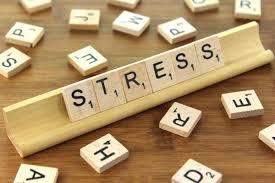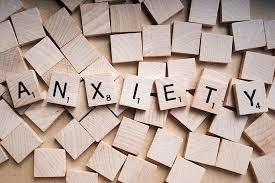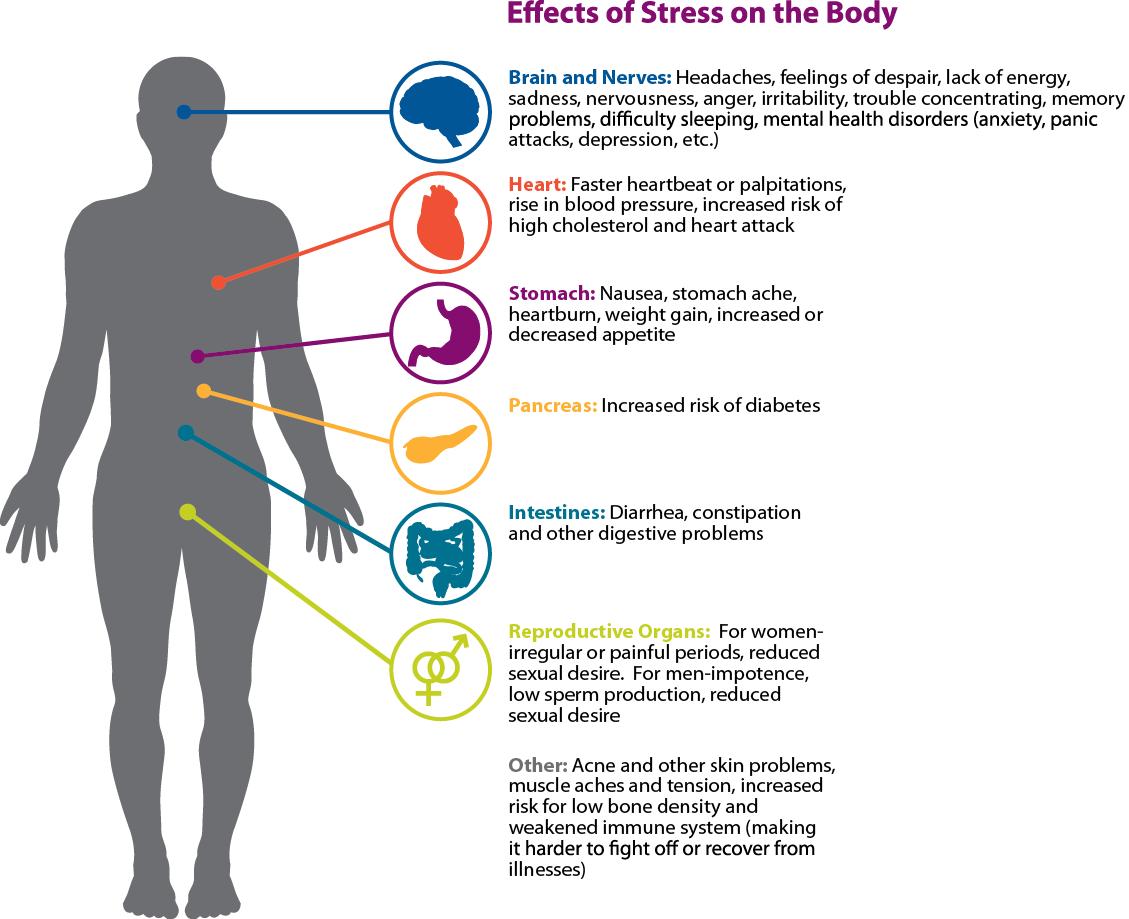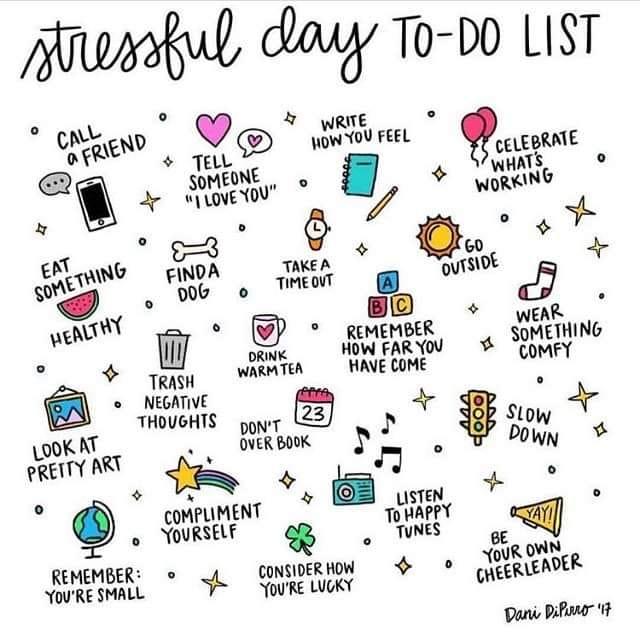.png)
.png)
.png)

Stress is a feeling of tension. Stress can feel frustrating, nervous, angry, and exhausting. Stress is provoked by stressors, such as pressure from school, family, or social issues.
Stress can be provoked by occasional or daily situations that require a great amount of thought or pressure. When you feel that a lot is expected of you, it is common to feel stressed. Stress can arise in all aspects of your life. Some possible examples are:
- School: You feel a great demand to do well on a test or project
- Social: You feel responsible for supporting a friend in need of comfort
- Family: You feel that much is demanded from you at home, such as getting your homework done, doing chores, or taking care of others
It is important to note that there is such a thing as positive stress. Stress is a natural and necessary part of life, and its purpose, even if it doesn't feel good, is to help you challenge and improve your mind and body. Positive stressors may include starting at a new school, welcoming a new family member into your life, moving to a new home, or anticipating a vacation. While events like these are sometimes bittersweet (a combination of concern and excitement), they are challenges that allow for emotional and personal growth.

Anxiety can feel much like stress and in general, can feel like fear and worry. Feelings of anxiety can be caused by stressful situations, such as frequent and overwhelming worry about upcoming tests or projects at school. Anxiety can also occur when you experience a particularly upsetting event or situation.
Anxiety can be caused by unwelcome situations that provoke fear or worry. You may feel a strong desire to avoid particular situations that feel unpleasant or cause emotional upset. Much like stress, it is possible for anxiety to seep into any part of your life. Some possible examples are:
- School: You avoid school or procrastinate on work or homework because the threat of underachieving or disappointment is too overwhelming
- Social: You avoid social situations or events with friends because of fear of uncomfortable situations or being rejected
- Family: You dwell on or obsess over changes in family dynamics (marriage/divorce, new or loss of family members, moving)
One main differences that separates stress and anxiety is when the feelings you are having cause you to avoid activities that you previously enjoyed, or you find yourself dwelling on stressful thoughts or situations over a long period of time. A good question to ask yourself is, "does my reaction match the size of the problem?". It’s okay if you’re still not sure whether you’re experiencing stress or anxiety. The important thing is that you ask for and receive help.
.png)
Stress and anxiety can be paired with a variety of symptoms. You might notice that you are generally upset or are not feeling or behaving like yourself. These symptoms may affect your relationships with friends and family and how you do in school.
 These are some emotional signs that you may be dealing with stress or anxiety:
These are some emotional signs that you may be dealing with stress or anxiety:
- Nervous or tense
- Irritable or frustrated
- Exhausted or overwhelmed
You may also notice some cognitive, or mental, symptoms:
- Worrying or racing thoughts
- Forgetfulness or disorganization
- Lack of focus or judgment
- Inability to concentrate
Stress and anxiety may also come with physical symptoms:
- Restlessness or feeling on-edge
- Fatigue and exhaustion
- Tight or stiff muscles
- Unregulated sleep patterns, such as difficulty falling or staying asleep
- Loss of appetite
It is very possible to find help managing these symptoms. By learning healthy habits, you will be able to develop greater well-being and will be prepared to handle various situations in your life.
More information about the 5 major types of anxiety disorders can be found at the National Institute of Mental Health.
.png)
 There is never any shame in asking for help or reaching out to the people you care about if you have concerns. Although there is no single “cure” for feeling total relief from stress or anxiety, there are quite a few things to consider that may help.
There is never any shame in asking for help or reaching out to the people you care about if you have concerns. Although there is no single “cure” for feeling total relief from stress or anxiety, there are quite a few things to consider that may help.
- Remember that stress and anxiety are common - Stress is a natural part of everyone’s lives, lots of people do or will experience some type of anxiety.
- Acknowledge your discomfort and fears - Much of the stress and worries you have concerning school, friends, and family affect your peers as well. It always helps to talk about it with people who you can trust with your feelings.
- Create routines of mindfulness - It is important to set aside time for yourself to be calm and ease your mind. Healthy distractions from the bustle of life are important for your success.
- Consider physical activities - Physical activity helps to alleviate mental fogginess and is another healthy distraction from stress.
- Set aside time for your social and creative outlets - Things like art, reading, writing, and music are important to your overall well-being and happiness. Make time also for in-person social events that make you feel fulfilled and connected to your peers and family.
.png)
If you or someone you know is at risk of harming themselves or others, please call 911 immediately.
If you are having a non-emergency crisis and are in need of support, please reach out to the resources below, including:
National Suicide Prevention Hotline: 1-800-SUICIDE (784-2433) or 1-800-442-HOPE (4673) or 1-800-273-TALK (8255) or text "TALK" to 741741
Support at School
There are many people at school who are willing to listen and talk. Please reach out to an adult at school if you need help. A list of school support resources can be found here. Information shared with school counselors and nurses will not be shared without your permission, unless there is a risk of harm to yourself or someone else.
Hotlines — Call & Text Support
If you or someone you know is at risk of harming themselves or others, please call 911 and notify the operator that you are having a psychaitric emergency. Ask for an officer trained in crisis intervention or psychiatric emergencies.
If you are having a non-emergency crisis, there are many resources for you to receive immediate relief by calling or texting with a trained crisis operator. Here is a list of some important numbers and resources to know about in case you find yourself or someone you know needing anonymous support.
National Suicide Prevention Hotline: 1-800-SUICIDE (784-2433) or 1-800-442-HOPE (4673) or 1-800-273-TALK (8255) or text "TALK" to 741741
If you are in crisis and need to speak with someone now, please call the National Suicide Prevention Hotline. They can help with many issues beyond suicide, including anxiety and drug help. They are toll-free, 24-hour, confidential hotlines which connect you to a nearby trained counselor.
NAMI Hotline: 1-800-950-NAMI (6264) or text “NAMI” to 741741
NAMI, the National Alliance on Mental Illness, is the nation’s largest grassroots mental health organization dedicated to building better lives for the millions of Americans affected by mental illness.
The Trevor Project: 1-866-488-7386 or text "START" to 678678
The Trevor Project is the leading national organization providing crisis intervention and suicide prevention services to lesbian, gay, bisexual, transgender, queer & questioning (LGBTQ) young people under 25.
JED Foundation: 1-800-273-TALK (8255) or text "START" to 741-741
The Jed Foundation (JED) empowers teens and young adults with the skills and support to grow into healthy, thriving adults.
Websites — Resources & Information
There are many resources about stress and anxiety and finding help. Below are some dependable links that you can browse for information and support.
Teen Mental Health
Teen Mental Health has the vision to help improve the mental health of youth by the effective translation and transfer of scientific knowledge.
Active Minds
Active Minds is dedicated to saving lives and to building stronger families and communities. Through education, research, advocacy, and a focus on students and young adults ages 14–25, Active Minds is opening up the conversation about mental health and creating lasting change in the way mental health is talked about, cared for, and valued in the United States.
HEARD Alliance
The HEARD Alliance (Health Care Alliance for Response to Adolescent Depression) provides resources for treating anxiety, depression, and related conditions, and preventing suicide in adolescents and young adults.
Anxiety and Depression Association of America (ADAA)
The Anxiety and Depression Association of America (ADAA) is an international nonprofit organization dedicated to the prevention, treatment, and cure of anxiety, depression, OCD, PTSD, and co-occurring disorders through education, practice, and research.
NAMI - National Alliance on Mental Illness
NAMI's mission is to be dedicated to building better lives for the millions of Americans affected by mental illness.
NIMH - National Institute of Mental Health
The National Institute of Mental Health (NIMH) is the lead federal agency for research on mental disorders.
Apps
There are certain apps designed to help you relax, sleep better, and track your emotions. Here are some that might be relevant to what you're looking for.
Smiling Mind
A daily mindfulness and meditation guide at your fingertips, equipping young people with the integral skills they need to thrive in life.
Calm
Learn the life-changing skill of meditation; get more restful sleep and wake up feeling refreshed; video lessons on mindful movement and gentle stretching; exclusive music to help you focus, relax, and sleep.
Headspace
Live a healthier, happier, more well-rested life with Headspace.
Insight Timer
The largest free library of guided meditations on earth with more than 27000 titles.
AbleTo
Sanvello offers clinically validated techniques and support to help you relieve symptoms and feel happier over time.
While we strive to make the information on these pages as timely and accurate as possible, we cannot guarantee this at all times. Any reference to any person, organization, activities, or products, or any links from this website to the website of another party, do not constitute or imply the endorsement, recommendation, or favoring of Shrewsbury Public Schools.
-
About Us
- Mission & Core Values
- Portrait of a Graduate
- 2023-2027 Strategic Plan
- 2025-2026 Strategic Goals & Action Steps
- Long-Term Financial Planning for Shrewsbury Public Schools
- Student Opportunity Act (SOA) Plan
- Sleep Health Advisory Committee/School Start Times
- School Department Report - 2022 Shrewsbury Annual Town Report
- 2018 & 2019 Annual Report
- Feedback From Stakeholders
- State of the District
- Student Enrollment & Staffing Levels
- Activities
- Administration
- Budget
- Bullying Prevention & Intervention
- Calendars
-
Communications
- Respiratory Virus Guidelines
- Equity Information
- Community Bulletin
- Shrewsbury School Journal
- Superintendent's Blog (opens in new window)
- Superintendent's Update
- Mailing Lists
- Social Media
- News
- Mandated Notifications
- Interpretation & Translation Services
- Translate a Document or Website Page
- 2018 & 2019 Annual Report
- 2017 Annual Report
- 2016 Annual Report (opens in new window)
- 2015 Annual Report (opens in new window)
- District Communications Survey Results Fall 2019 (opens in new window)
- District Communications Survey Slide Presentation December 2019 (opens in new window)
- Contact Us
- Directions
- Enrollment Data
- Equity
- Frequently Requested Forms & Applications
- Safety & Security
- Shrewsbury Education Association (opens in new window)
- School Wellness Advisory Committee (SWAC)
- Staff Resources
- Student Registration
- Superintendent
- Support Organizations
- Volunteer Opportunities
- Well-Being Guide
This site provides information using PDF, visit this link to download the Adobe Acrobat Reader DC software.
